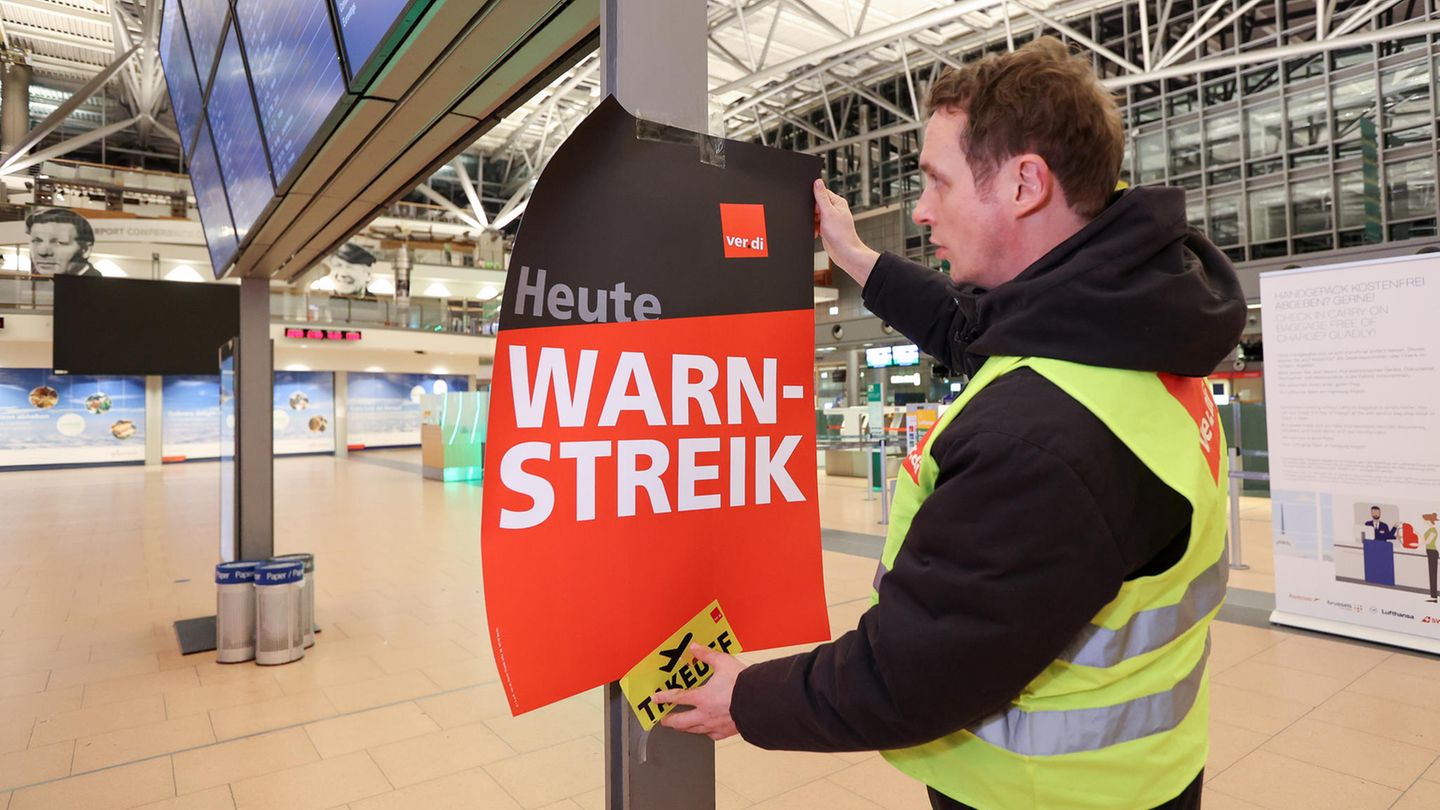It’s about more money, better working conditions and sometimes also a shortening of weekly working hours: there will be a lot of collective bargaining again in 2024. Today, Thursday, eleven airports will be on strike and on Friday public transport will be at a standstill in many cities.
Germany in strike mode: The latest strikes at Deutsche Bahn have barely ended when the aviation security forces continue. With a warning strike at numerous airports on Thursday, they will paralyze large parts of German air traffic. On Friday, the bus and tram drivers will go on strike: There are currently several tariff disputes with a major impact on the population. What else is in store for consumers this year? An overview.
Verdi called on employees of private security services at eleven airports not to work on Thursday. There will be strikes at the airports of Hamburg, Bremen, Hanover, Berlin, Cologne, Düsseldorf, Leipzig, Dresden, Erfurt, Frankfurt/Main and Stuttgart. Exceptions are said to be Munich Airport and some smaller airports. The aviation security forces usually work on behalf of the Federal Police at the checks for passengers, baggage and personnel. Verdi is negotiating nationwide for around 25,000 employees with the Federal Association of Aviation Security Companies (BDLS).
A warning strike in local public transport continues on Friday. Verdi has called on employees in local public transport in almost all federal states to do so. Bavaria is excluded because there are currently no negotiations there. In Berlin, the strike should also be limited to the morning. Nevertheless, passengers in many regions have to prepare for extensive restrictions on bus, road and subway traffic. According to Verdi, more than 130 municipal companies in around 80 cities and around 40 districts with a total of 90,000 employees are affected by the parallel collective bargaining in public transport.
The collective bargaining dispute between Deutsche Bahn and the German Locomotive Drivers’ Union (GDL) will continue in the next few weeks without any further strikes. The collective bargaining parties want to negotiate again. There should be no further GDL industrial action until March 3rd.
Strike not only in public transport – university hospital doctors are also in industrial action
University hospital doctors also recently stopped work for a day. Several thousand doctors took part in a warning strike by the Marburger Bund union on Tuesday. According to the union, some patients had to prepare for longer waiting times. Non-urgent operations have also been postponed. The more than 20,000 doctors at the 23 state-owned university hospitals nationwide were called upon.
Warning strikes are also not ruled out in the Lufthansa Group. The UFO cabin union has unilaterally broken off salary negotiations for around 18,000 flight attendants at the parent company, UFO announced on Wednesday. The union barely concealed the threat of a strike, even though the collective bargaining committee had not yet made a decision.
TradeIt is still unclear how the deadlocked tariff conflicts in retail, wholesale and foreign trade will continue. Accompanied by numerous warning strikes, negotiations have been going on there for several months – in some tariff areas since April 2023.
The tariff archive of the Economic and Social Sciences Institute (WSI) of the Hans Böckler Foundation in Düsseldorf has a comprehensive overview of the tariff landscape. Accordingly, collective remuneration agreements agreed by the DGB unions alone will expire between December 2023 and December 2024 for almost twelve million employees. The collective agreements in the printing industry (109,000 employees), the construction industry (731,000) and the temporary employment industry (700,000) will end in the spring. The current collective agreements in the chemical industry (585,000) and the catering industry (79,000) expire in June. Collective bargaining will begin in September 2024 in the metal and electrical industry, the largest collective bargaining industry in Germany with over 3.6 million employees. The collective agreements for the public sector at the federal and local levels (2.4 million employees) will expire at the end of 2024.
Experts expect conflict-filled negotiations
Experts expect “conflict-filled collective bargaining” Collective bargaining expert Hagen Lesch from the German Economic Institute (IW) expects “conflict-rich collective bargaining”. The unions would strive to increase real wages, writes Lesch in a recently published analysis. “Since the inflation compensation premium has already been largely exhausted, this instrument cannot make it any further easier to find a compromise.” Recently it has been observed that some unions are demanding high wages and demanding bonuses “on top”. “In addition to this expansive orientation of the unions, they use conflict to gain members.” All of this speaks for conflictual collective bargaining. According to Lesch, whether the level of conflict in 2024 will be as high as in 2023 also depends on employers’ willingness to compromise. Because: “On the one hand, many companies are suffering from the current phase of stagnation, but on the other hand, the need for work and skilled workers remains high in many places.”
Labor disputes
114, 117, 449 days: The longest and largest strikes in Germany
The bargaining position of employees has improved
Thorsten Schulten, the head of the WSI collective bargaining archive, sees it similarly: “The toughness of the negotiations will depend above all on the extent to which employers are prepared to recognize their employees’ interest in real wage increases,” he told the German Press Agency. In many industries, the negotiating position of the employees has improved significantly due to the lack of skilled or even general labor shortages. “This leads to a new self-confidence and a greater willingness to stand up for one’s own interests. This could actually lead to more warning strikes.”
However, most strikes in Germany are small company and local strikes that the public hardly notices, says Schulten. Strikes in large collective bargaining sectors such as the construction industry, the chemical industry or the metal and electrical industries are hardly noticed in everyday life by citizens.
However, strikes in the transport sector, i.e. public transport, trains and airports, would massively disrupt people’s everyday lives. There is also a high level of concern during strikes in the public sector, for example in daycare centers or hospitals. “However, collective bargaining in the public sector will not begin again until the beginning of 2025, so no strikes are expected here this year.”
Source: Stern




